LSLLN Summit 2024
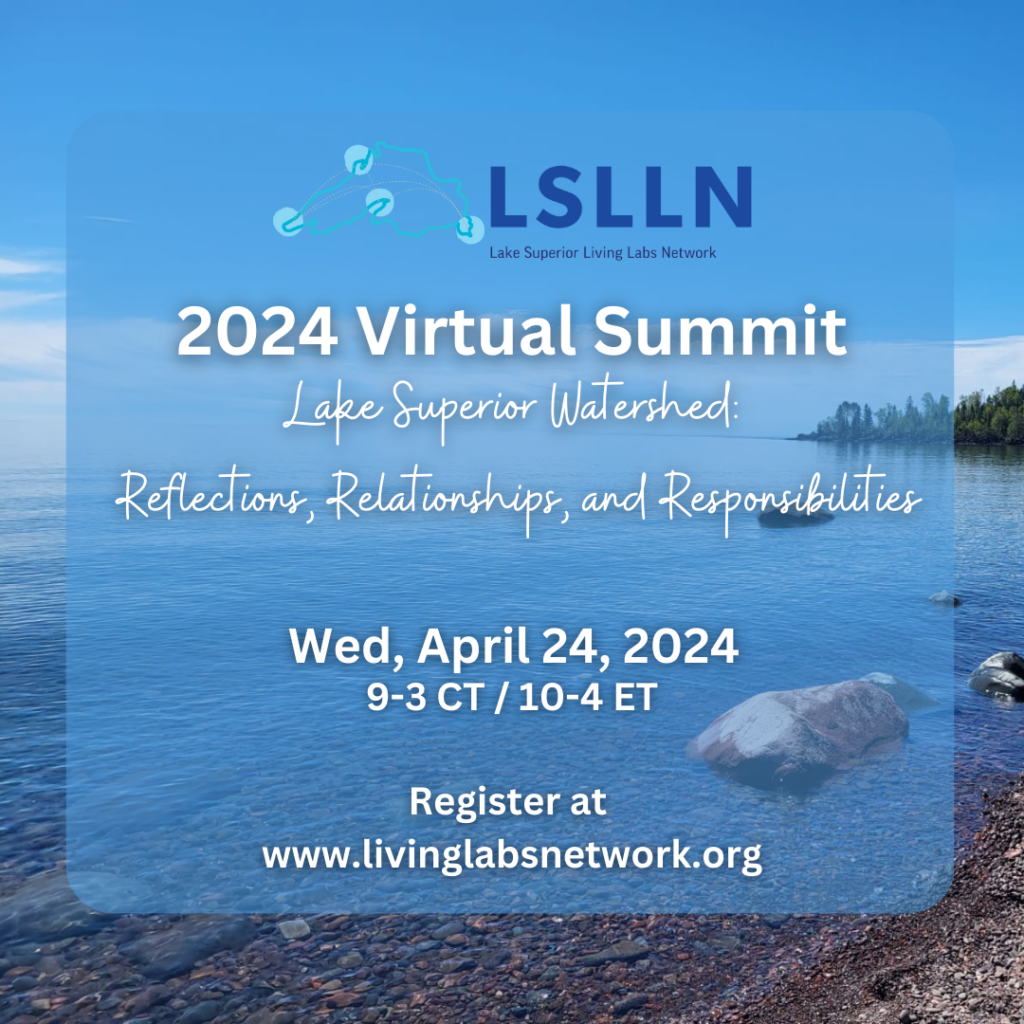
Lake Superior Watershed: Reflections, Relationships, and Responsibilities
The summit had three goals:
- Share out, and celebrate, the first five years of the Lake Superior Living Labs Network.
- Explore the question – why do watersheds matter for living well in all that we do? This includes all social and ecological systems – health, economic development, education, energy transitions, food systems, policy, climate, biogeochemical systems, and others.
- Create space to connect directly with other people in small groups, who live across the Lake Superior watershed, but engage in similar fields/disciplines.
2024 Summit Recordings
Welcome & The LSLLN Headwaters
In this opening session of the 2024 Lake Superior Living Labs Network (LSLLN) Summit, participants learned about, reflected on, and celebrated the first five years of the Lake Superior Living Labs Network – its headwaters. This included a description of the three key approaches to the LSLLN: watershed thinking, just sustainabilities, and living labs (learning by doing), an overview of partners, a review of numerous projects completed, a brief summary of research findings from 2023, and some questions now being explored for future changes.
Panel – Why Watersheds Matter: Shared Relationships and Responsibilities for Living Well
In this session panelists Courtney Vaughan, Sarah Siska, Quinn Meawasige, and Joan Chadde shared their perspectives from different disciplines, sectors, and places on how we think about, learn from, work responsibly in, and build relationships with watersheds. Drawing on their own personal experiences they shared stories, histories, and current projects that expressed how they relate to watersheds. Questions followed the panelists’ presentations. April 24, 2024.
Panelists
Joan Chadde
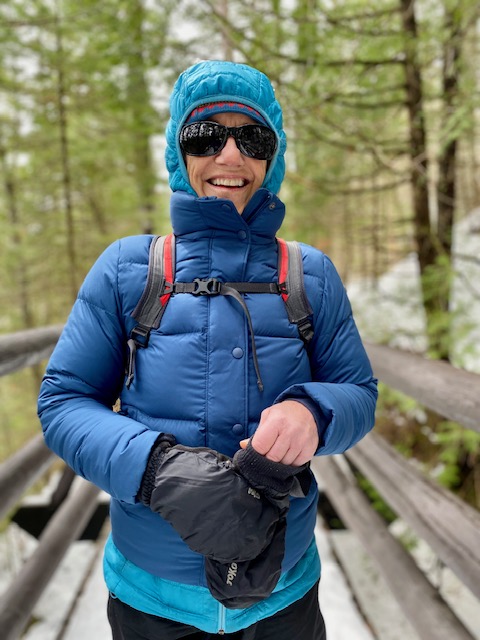
Quinn Meawasige
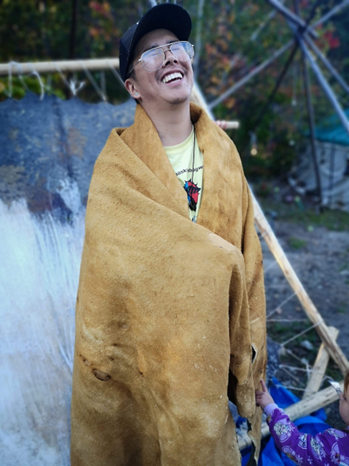
Sarah Siska
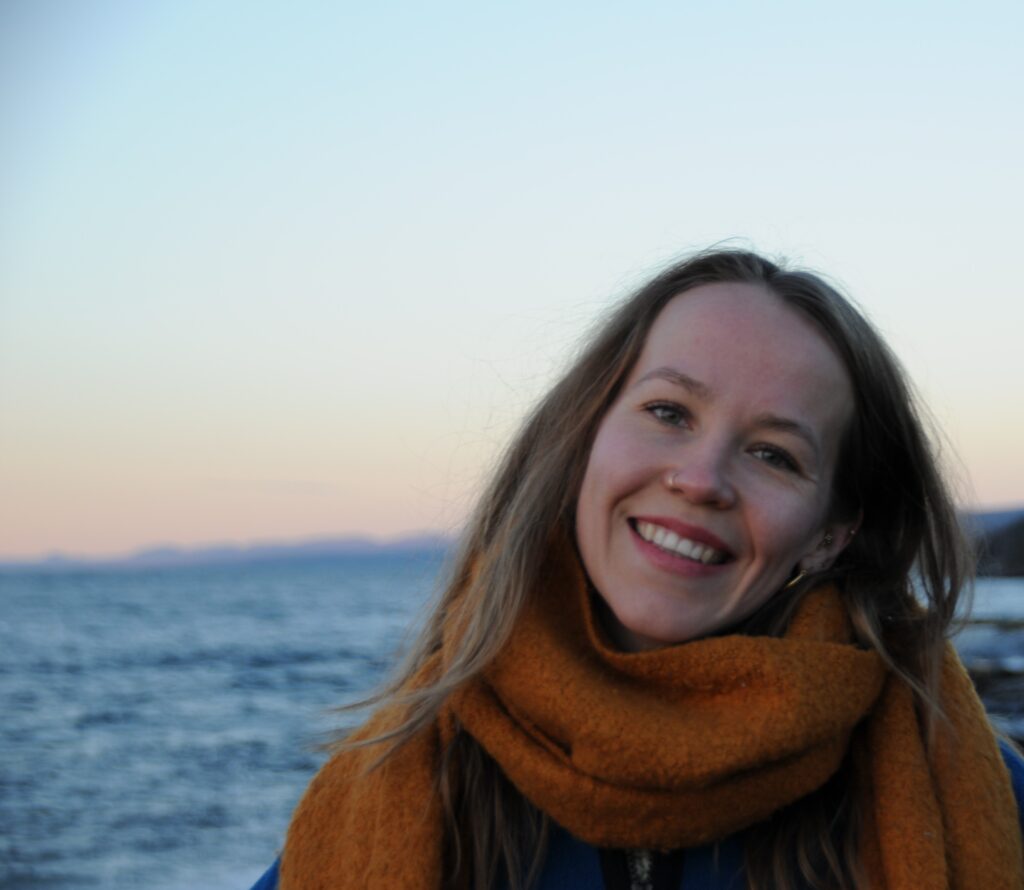
Courtney Vaughan
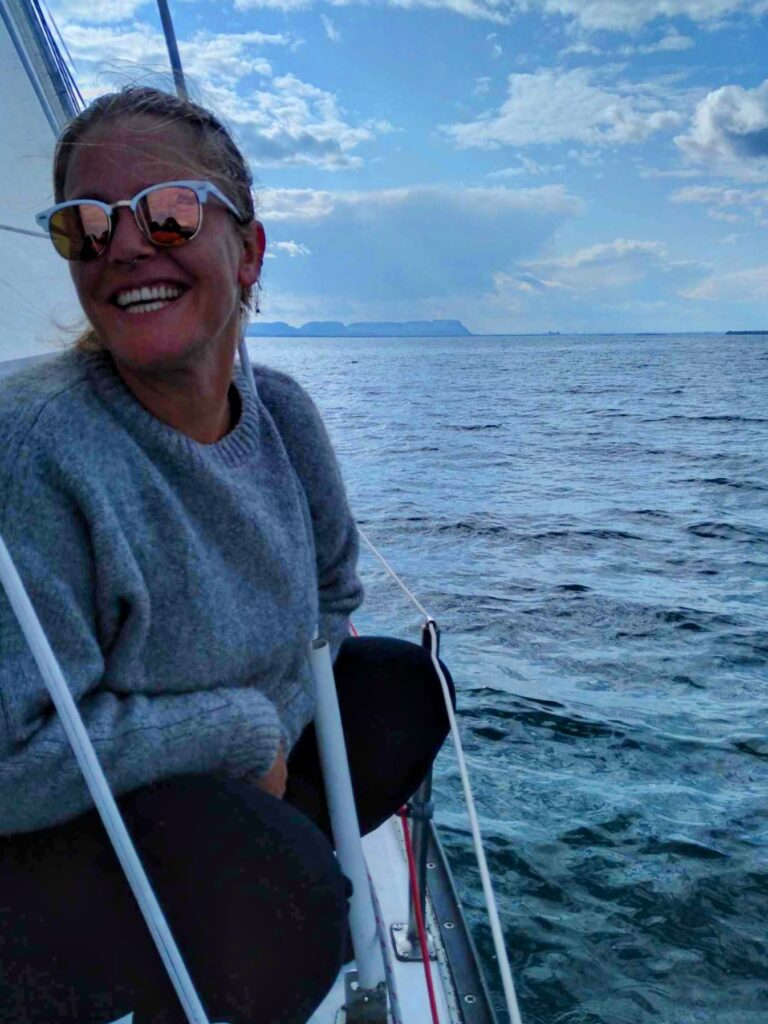
Joan Schumaker Chadde was the director of the Michigan Tech Center for Science & Environmental Outreach from 1995-2023. The Center is entirely grant-funded, and has been engaged in a great variety of programs focused on promoting environmental literacy and Lake Superior stewardship. She has also been engaged in promoting diversity in STEM and natural resource careers. Programs include: coordinating the Lake Superior Youth Symposium since 1999, co-sponsor of the Lake Superior Stewardship Initiative since 2007, conducting teacher workshops and K-8 outdoor science field trips since 2000, conducting family science & engineering events at elementary schools across Michigan, and organizing a High School STEM Internship Program and 6-day Natural Resources & Engineering Exploration program at MTU for under-represented students from across the state.
Quinn Meawasige is Anishinaabe from Serpent River First Nation. He graduated from Algoma University with a Bachelor of Arts in Community Economic and Social Development and a Certificate in Anishinaabemowin from Shingwauk Kinoomaage Gamig. Quinn currently works as the Northeast Community Relations Lead for Gaagige Zaagibigaa, an Indigenous Food Sovereignty Initiative servicing Indigenous Peoples in Northern Ontario. Quinn became a founding member of the Waterways Collective, an Anishinaabe paddling collective whose recent work involves, a contaminants testing initiative in his communities waterways, and a Mnoomin (wild rice) revitalization initiative. Quinn is an active harvester, fisherman, hunter, forager, language learn/advocate, and outdoor adventure seeker. He is always working to make land and water based learning opportunities accessible for his family, community and peoples.
Sarah Siska is a settler born and raised on the north shore of Lake Superior working at the intersection of social and ecological justice in community food systems. She holds a Bachelor of Arts in Critical Indigenous Studies from the University of British Columbia and a recently earned Master of Environmental Studies from Lakehead University. For her thesis she circled Lake Superior, mapping foodshed imaginaries across the watershed to explore the intricate social and ecological relationships between people and the places they call home. Currently working as the Coordinator of the Thunder Bay + Area Food Strategy, Sarah is committed to reimagining ecological approaches to community care. Most importantly, she really loves moss and rocks.
Courtney Vaughan has over 15 years of practice in experiential and land-based education. She is a Métis woman from just outside of Bawating/Sault Ste. Marie with a lifetime worth of land and cultural knowledge. She has worked in various roles with the Métis Nation of Ontario (MNO) and is currently their Environmental and Climate Change Lead Specialist. She has worked for various research and consulting firms, federal public agencies, academic institutions, and non-for profits pertaining to Indigenous rights, arts and culture, recreation, stewardship and conservation; equity, diversity and inclusion; and experiential and community-based education. She has explored this field across Canada, Latin America, and East Africa. She has worked for clients such as Canada Council for the Arts, Parks Canada, Heritage Canada, the Métis Nation of Ontario, Canadian Geographic, and the Canadian Women’s Foundation. She is currently studying for her PhD in Health Sciences at Lakehead University, focusing on how the canoe can be used as a tool to promote eco-social health across the Lake Superior watershed.
Documentary Screening
Lake Superior Our Helper: Stories from Batchewanaung Anishinabek Fisheries
Registrants for the LSLLN Summit received a link on Wed, April 24 where they could stream the documentary anytime between Wednesday, April 24 and Friday, April 26.
Lake Superior Our Helper follows Chief Dean Sayers through a series of conversations with community members to reveal the cultural, political, and ecological relationships surrounding their fisheries. Inviting us on a journey of Lake Superior, the film shares the messages of Elders, youth, fishers, community leaders, and their visions for the future of Batchewana’s fisheries. It also documents how fishing has changed over time, conflicts with the state around management and regulation, principles of Indigenous law, and the culture and ceremony that are deeply embedded within fishing practices.
Fishing has been an essential element of Batchewana’s sustenance, identity, and livelihood from time immemorial. Beyond food, the Anishinabek and Ojibwe People of the Great Lakes region have a long established set of practices, lifestyles, and governance structures that are deeply integrated into cultures and communities. The arrival of Europeans and the eventual establishment of the colonial state violently disrupted Indigenous ways of being. However, Indigenous people have persisted. This has included court battles to protect Inherent rights and active participation in traditional fishing activities despite ongoing and often violent state suppression.
Today, Batchewana operates the largest and most successful fishery on the Canadian side of Lake Superior. This includes 27 captains and their crews that depend on the fisheries for sustenance as well as sales to local processing plants, restaurants, shops, and farmers’ markets across the region. Batchewana fisheries have adopted a range of new technologies and techniques while embedded in Traditional Ecological Knowledge (TEK) and in alignment with oral teachings.
Who Attended?
Anyone who lived and/or worked in the Lake Superior watershed who was keen to meet, learn from, and potentially collaborate with others in the watershed on issues around climate, energy, food, water, land, health, and their intersections. Folks did not need to already be part of the LSLLN.
A screenshot of a Zeemap below shows the locations of attendees.
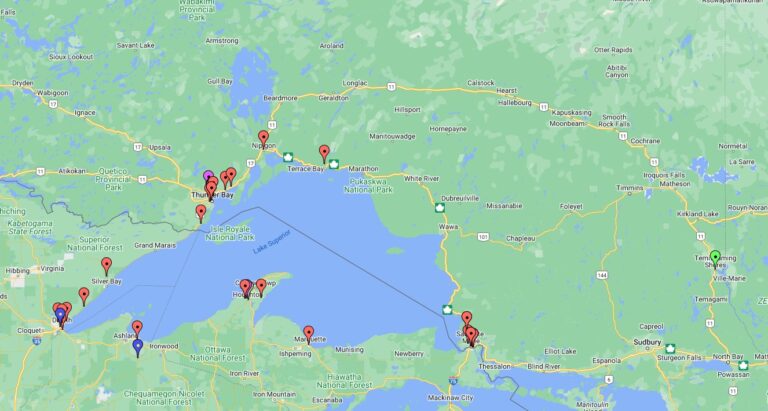
Agenda
For Your Musings Prior to the Summit
In anticipation of the summit, we invited all registrants to consider this question – What do you want to bring to life (or contribute to) in the Lake Superior watershed that would benefit from connecting with others in the watershed? These could be existing or new/messy ideas.
Time (CDT) | Time (EDT) | Session Title |
9:00 | 10:00 | Welcome & The Lake Superior Living Labs Network Headwaters |
10:20 | 11:20 | Break |
10:30 | 11:30 | Why Watersheds Matter – Shared Relationships and Responsibilities for Living Well (panel) |
11:30 | 12:30 | Break |
12:00 | 1:00 | Lake Superior Watershed Connection Chats
|
12:45 | 1:45 | Break |
1:00 | 2:00 | Lake Superior Watershed Connection Chats
|
1:45 | 2:45 | Break |
2:00 | 3:00 | Lake Superior Watershed Connection Chats
|
2:45 | 3:45 | Closing |
3:00 | 4:00 | Done |
Evening | Documentary Screening (Details forthcoming) | |
Session Descriptions
Welcome & The LSLLN Headwaters
In this opening session, we will reflect on and celebrate the first five years of the Lake Superior Living Labs Network – its headwaters. This will include a description of the three key approaches to the LSLLN: watershed thinking, just sustainabilities, and living labs (learning by doing), the initial governance structure, a review of numerous projects completed, and some questions now being explored for future changes. This session will be recorded.
Why Watersheds Matter – Shared Relationships and Responsibilities for Living Well (panel)
Join us for a panel presentation to expand our thinking on why watersheds matter. You will hear perspectives from different disciplines, sectors, and places on how we think about, learn from, work responsibly in, and build relationships with watersheds. This session will be recorded.
Watershed Connection Chats (Six themes total)
In the afternoon, the goal is to allow folks to connect directly, honestly, and casually with one another across the Lake Superior watershed – to foster connections along themes of interest (not just traditional sectors, disciplines, or jurisdictions). This is the time to bring your most extroverted self and trust that the other people in the room want to learn and connect with you! We know the work you do may overlap across multiple themes – we encourage you to join multiple chats if you’re able.
Each watershed connection chat will begin with a brief introduction, then we will create breakout rooms of 4-7 people (based on attendees’ interests) where you can chat directly in small groups about what you do, learn what others do, and even share thoughts around complex issues you may all be experiencing. You may meet future colleagues (researchers, teachers, practitioners, community members), find a guest speaker for a course, take away a website, realize that someone in your organization really needs to connect with the person in the room with you, or even jot down a name and email address of someone to follow up with in the future – now doesn’t that sound worth it? We think so. These watershed connection chats will not be recorded.
